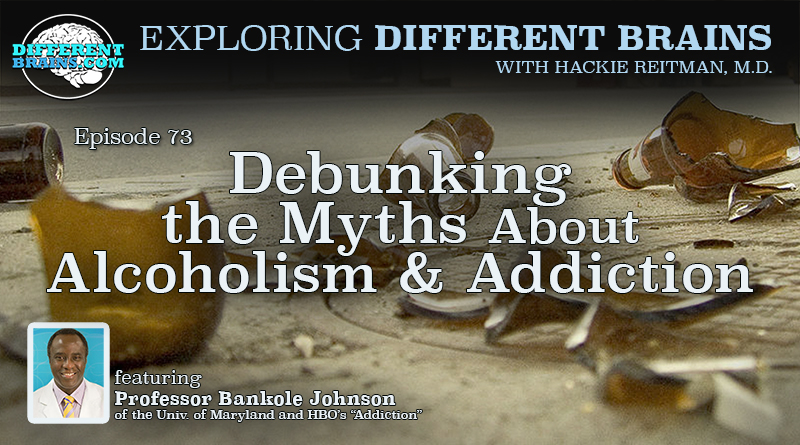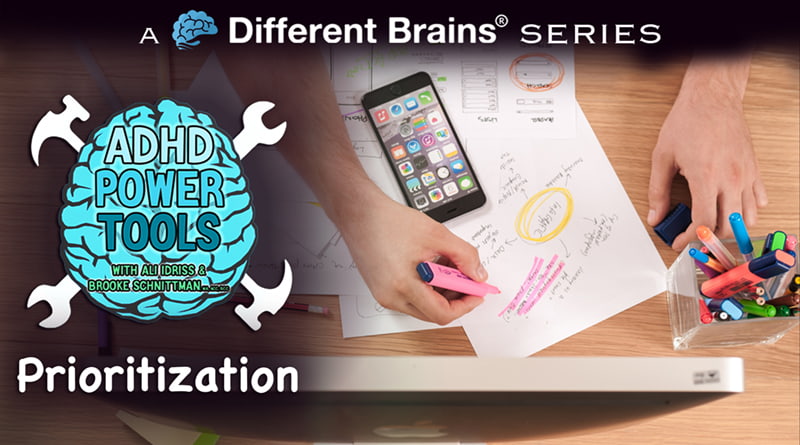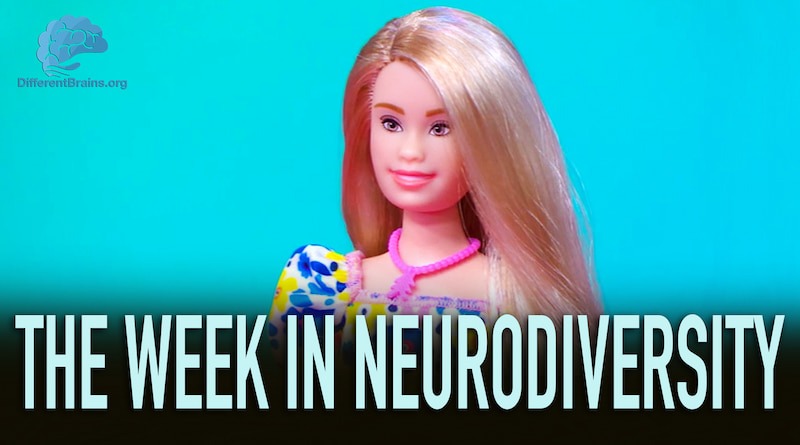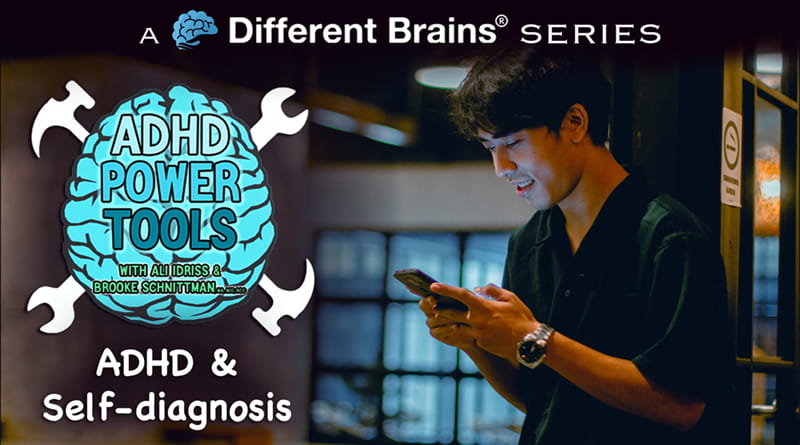
Debunking the Myths About Alcoholism & Addiction, w/ Professor Bankole Johnson of the U of Maryland and HBO’s “Addiction” | EDB 73
In the second installment of a two part interview, Hackie Reitman, M.D. speaks with Bankole A. Johnson, DSc, MD, MBChB, MPhil, FRCPsych, DFAPA, Dip-ABAM, Dip-ABDA, FACFEI, who heads the Brain Science Research Consortium Unit (BSRCU) at the University of Maryland School of Medicine, and is one of the world’s leading authorities on the subject of addiction. He is a leading neuroscientist and a pioneer in the development of medications for the treatment of alcohol abuse, and was featured on the HBO documentary series, “Addiction.” Professor Johnson discusses the effects alcohol has on the brain, details his work with the Maryland Emergency and Opioid task force, and debunks some common myths about addiction.
To find out more about Professor Bankole Johnson and the work he is doing with the Brain Science Research Consortium Unit (BSRCU), visit: medschool.umaryland.edu/bsrcu
For Professor Johnson’s personal site, visit: http://bankolejohnson.com/
For BSRCU’s newsletters, click here.
For the psychiatry department at the University of Maryland School of Medicine, visit: medschool.umaryland.edu/psychiatry
For information about the HBO Addiction project, for which Professor Bankole Johnson was a contributing expert, visit: www.hbo.com/addiction
And Professor Johnson can be followed on Twitter here: https://twitter.com/bankolekolej
40 Second Preview:
To listen or download the audio-only, podcast version of this episode, see the embedded player below.
Or look for us on your favorite podcast provider:
iTunes | Stitcher | SoundCloud
[expand title=”Click Here to View Full Transcript”]
HACKIE REITMAN, M.D. (HR): Hi I’m Dr. Hackie Reitman; welcome to another episode of Exploring Different Brains this is the next part of Dr. Bankole Johnson University of Maryland, one of the world’s authorities on addiction and also neurodiversity. Dr. Johnson welcome.
PROFESSOR BANKOLE JOHNSON (BJ): Thank you and I’m so pleased to be on your show, thank you for having me on your show.
HR: What I’d like you to tell our audience because you are among the world’s expert alcohol. Tell us what alcohol does to your brain and use that as an example of neurodiversity.
BJ: Gosh you couldn’t give me a simpler question could you?
HR: haha
BJ: So what happens when you drink? When you take your very first drink? Your very first drink sends off a lot of signals in the brain, usually start in what’s called the mono immune system and these basically warn you that you’re about to drink. So for example if you went to a bar and you had a drink of alcohol you start to feel the effects after a couple of minutes with your buddies. While lone behold the alcohol doesn’t even reach your brain for 15 minutes so what is happening is your brain is pretending it has alcohol and it starts to process this information in different brain regions. If you start to drink a lot what happens is your brain begins to gets its genes to develop coding systems where by it basically tries to keep as if the alcohol is there all the time so it keeps sending these signals and you kept drinking and if you keep drinking more what happens is parts of the brain get destroyed. Parts of the brain that gets nerves begin to collapse in that part of the brain; the brain becomes to fold and becomes more plastic. Basically begins to fold and shrink on itself and sometimes when people drink too much they can develop dementia, they can develop memory impairment, and that’s because of all this confirmation that is going on in the brain and shrinkage of the brain and the expansion with spaces of the brain. The brain is a three dimensional object, we do have spaces and some of the spaces get larger, so basically if you think there are holes in the brain the holes get bigger while the actual substances get less. This produces neuroplasticity conformational change in the brain that once it gets going it’s very hard to stop indeed.
HR: Now another thing that you have done, to be part of the Maryland Emergency and Opioid task force. Tell us about that.
BJ: Well as you Maryland has a significant epidemic with regards to opiate use disorder. It’s estimated that up to 10% of people in the city have some kind of opiate use disorder or have a compulsion to use opiates. That’s 60 thousand people in just the city alone.
HR: Tell us examples of opiates for our audience.
BJ: Opiates are things like heroin, fentanyl, morphine, sometimes its methadone, but sometimes the methadone is used as a treatment, Percocet has codeine in it as well which is part of opiates but there are a large number of this. Oxycodone is one that is probably or oxycotin is one that is most familiar. What tends to happen or has happened is that the epidemic is now so large that governor, Governor Hogan did a really marvelous thing with the governor in setting up this commission to Tran study this problem and provide real answers that will help the citizens of Maryland and hopefully other citizens of other places, in other places in the United States. But this is a program that I think is so so needed, it’s really very sad if you come to some of these clinics and you see the level of suffering and you see people who are desperate and you see individuals who have opiate use and it’s generational. Son is an addict, dad is an addict, mom is an addict. It’s a level of human suffering that you have to do anything about if you’re any kind of humanitarian, let alone just a doctor.
HR: Go ahead and expound on the opioids.
BJ: Well one of the myths, medicine is surrounded by myths just like in any special. One of the myths that used to be put into play was there was a time when people didn’t really want to get pain meds at all, they were scared and therefore the reps came along and said so long as you give individuals opiates for pain they can never become addicted. Well it’s really not true at all and in fact, this myth has persisted almost to the present day and when I was ill, not that long ago I was in the hospital and I had some pain, I was discharged with 60 tablets of oxycotin. What in goodness name would I be required to do with it? My wife saw this and she poured it down the toilet and I helped her flush it down. One of the important things is most people and one of the things you were doing in the days when you were a boxer was very smart and I’ll tell you why. Pain is an emotion, everybody tends to just think of pain as a sensation and most people who are pain specialist know it’s an emotion. Different people perceive different levels of pain. You can hit one person in one way and feel a lot of pain another person feels less pain, it’s emotion and it’s depended upon the person’s emotional response and how they’ve had painful experiences in the past and there for the treatment for pain is not just giving someone a pain killer it is an emotional there is an emotional component to it, whether it be you give them a warm compress, whether it be that you talk with them, whether it be that they have an stimulation or something else but the treatment of painful conditions is not simply giving somebody a painkiller. That is pretty poor medicine and that is usually done because it’s fast, easy, you give someone a script and they’re gone.
HR: Since you are one of the world’s experts on addiction and alcoholism if there is anybody in our Different Brains audience dealing with a loved one who might me an alcoholic or an addict, what is one pearly you might give them before you leave?
BJ: Well I’ll be quick. The best way of saying it is go and see your doctor and develop an ask and demand evidence based treatment. Do not accept one type of treatment alone as a single modality for getting better, if your doctor says just go and see X or just go and see Y that is not good treatment. There are important guidelines that are being put up by the national institute of health, in fact I helped write some of these clinical guidelines on how to approach this problem and the doctors need to be able to do this. If you go to the website there is a protocol on how doctors should be able to assess, treat, and respond to people with alcohol abuse disorders. If that doesn’t work out find your nearest academic center and try and go through their program to be able to get better. One of the important things I do want to say to your viewers, for people who have alcohol use disorder, is and I’ll just tell you another myth. The other myth is that it’s somehow an intractable disease, people are hardly ever cured, and people just get worse all the time. This is far from the truth. The real issue is that a lot of people do get better from alcohol use disorder. In fact the spontaneous remission rate alone in one year is 25% so people do get better. So the problem is the few people who don’t get better who have intractable problems seem to be the ones who are held up as examples. Good treatment is important and I’ve wrote a really important article and it was actually confirmed by a study done by youth of health. That the first hour that you spend with a physician that knows what he’s doing in treating you for alcohol use disorder accounts for almost 60% of your total recovery outcome. So that doctor better not get that first hour wrong otherwise they’ve missed 60% of what’s needed to get you better.
HR: Can you just say again how people can reach you Dr. Johnson because I would like our audience to know how they can reach you, can you tell them how to get ahold of you?
BJ: Well the best to get ahold of me is to go to the University of Maryland School of Medicine website and on that website you’ll be able to find my email address and my telephone number and you can either call me or email me and I’ll make sure you get a response as quickly as I can.
HR: Thank you so much, one more quick question. What was it like being in that HBO documentary Addiction?
BJ: That was fascinating, that’s a long story, you know I was working with the producer at HBO and they called me and said well Bankole you know it’s ok if you have all of these patients that you’ve self selected that you’ve got these great outcomes but what we want to do is see if what you do works. If we give you a real patient, find a real patient as someone who they were going to find and eventually found this chap who might not have really qualified for one of our studies, and I said to them was all I need is 15 to 20 minutes a week with this gentlemen and I’ll prescribe the meds and do the psychological support. So they chauffeur him from almost 40 miles away so I couldn’t have any contact with him. And he had a great outcome so I’m glad that worked out for him and I’m glad that worked out for me as well I suppose. It was a demonstration that it can be done. The patients that were in the HBO program were selected by the producers just to make sure they weren’t friends of mine or they weren’t my family patient or best outcome patient, and they made sure that they were really tough and kept to the time. So what you saw in that program was a very accurate representation of really the positive outcomes of having a combined treatment of alcohol dependence.
HR: That’s great. Bankole keep up the great work man, you’re the best, I’m telling you you’re the man.
BJ: You’re very kind.
HR: I look forward to meeting you in person sometime too and till next time, Dr. Bankole Johnson University of Maryland, thank you so much.
BJ: Thank you so much, you have a wonderful rest of your day.
[/expand]
This video is owned by Different Brains Inc, kindly donated by it’s original producer PCE Media LLC.
Different Brains® Inc. founder Harold “Hackie” Reitman, M.D. is an author, filmmaker, retired orthopedic surgeon, former professional heavyweight boxer, the past chairman and president (and current board member) of The Boys and Girls Clubs of Broward County, and a neurodiversity advocate. However, it was his role as a father that led to the creation of the DifferentBrains.org website.
Hackie’s daughter Rebecca grew up with epilepsy, 23 vascular brains tumors, and underwent 2 brain surgeries before the age of 5. Her struggles and recovery put him on the road to, through 26 professional heavyweight boxing matches, raising money for children’s charities (to which he donated every fight purse).
Rebecca eventually went on to graduate from Georgia Tech with a degree in Discrete Mathematics, and Dr. Reitman wrote and produced a film based on her experiences there (The Square Root of 2, starring Darby Stanchfield of ABC’s Scandal). After graduation, Rebecca received a diagnosis of Asperger’s syndrome. Hackie, shocked at his own ignorance of the topic despite being an M.D., embarked on years of research that culminated with his book Aspertools: The Practical Guide for Understanding and Embracing Asperger’s, Autism Spectrum Disorders, and Neurodiversity (released by HCI books, publishers of the Chicken Soup for the Soul series).
This experience revealed to Hackie the interconnectedness of the conditions that fall under the neurodiversity umbrella, while alerting him to the in-fighting and fractured relations that often plague the organizations tasked with serving the community. Convinced that overcoming these schisms could help all of society, Hackie forged the Different Brains philosophy of inclusive advocacy: “Supporting Neurodiversity – From Autism to Alzheimer’s and All Brains In Between”.
In the company’s initial years of operation, Hackie self-financed all of the content on DifferentBrains.org, all of which offered free to view to the public. Currently he is the host of our weekly interview show Exploring Different Brains, writes blogs for the site, and tours the country speaking at conferences, conventions and private functions, all with the goal of improving the lives of neurodiverse individuals and their families, and maximizing the potential of those with different brains. Separate from Different Brains, Hackie is the founder and CEO of PCE Media, a media production company focusing on reality based content. He recently co-executive produced the documentary “Foreman”, the definitive feature documentary on legendary boxer and pitchman George Foreman.




